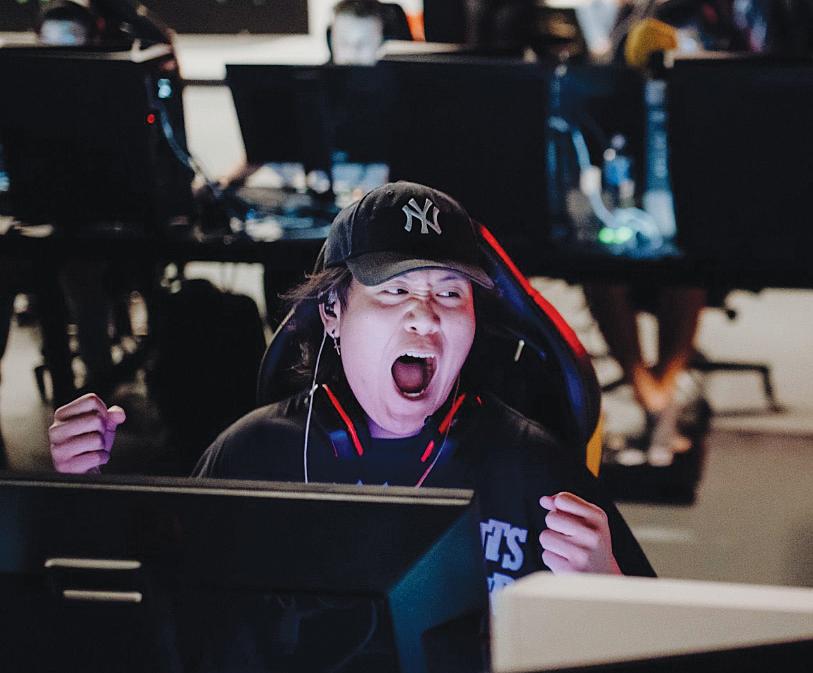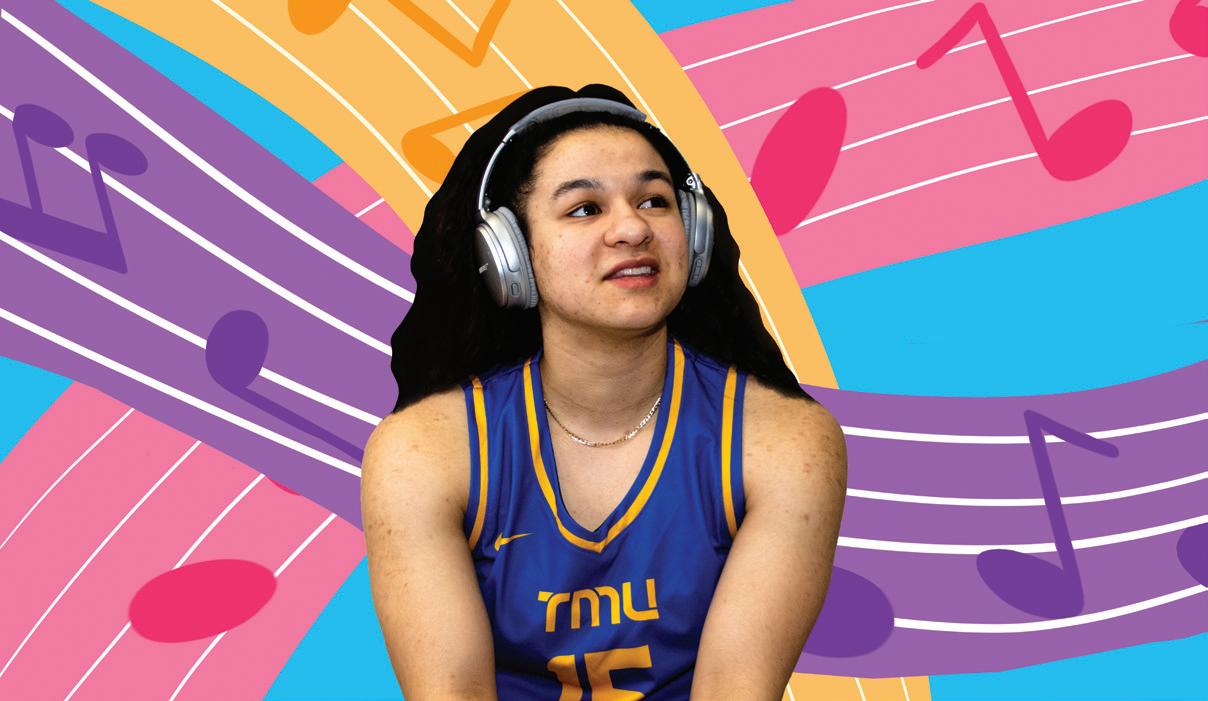
6 minute read
Examining the legacy of one of the most mysterious and successful esports teams at TMU
from Vol 56 Issue 21
By Dexter LeRuez
In the ever-evolving world of esports, collegiate-run organizations have become a new pathway for aspiring pros to polish their talent and compete in their games of choice.
Advertisement
As many universities across North America are investing heavily in the esports ecosystem, collegiate tournaments have begun to pop up everywhere to provide these teams with a place to play.
Leagues are filled with teams following a simple naming convention. Take a school’s name or mascot and place the word “esports” or one of the school’s colours behind it and you have your team name.
However, simple naming conventions fail to describe the legacy of a team from Toronto Metropolitan University (TMU) that played an instrumental role in propelling the school to the forefront of Canadian university esports. A team whose name shook up the status quo and refreshed the collegiate Valorant scene—a team called the TMU SHORTYKINGS.
“Schools found it funny that we were called the SHORTYKINGS,” said second-year business technology management student and former SHORTYKINGS player Levi “v1rus” Montana. “SHORTYKINGS was typed in all caps, it’s almost like we are yelling it at you.”
Although the SHORTYKINGS an- nounced they were disbanding this past fall semester, the legacy of both their name and in-game performance will last for years to come.
It took time for the SHORTYKINGS to establish their legacy ingame like they had with their name. The team opted to skip many league games and tournaments in 2021 in order to go out with friends on the weekend, which forced them to forfeit matches or attempt to find substitutes on short notice.
But come August of 2022, the SHORTYKINGS formed a new roster that defined who they were and their legacy for years to come.
The team began to take practice seriously and their skills rose to a new level, holding their own among the best in Canadian collegiate Valorant, a first-person shooter developed by Riot Games that combines the tactical gameplay of Counter Strike: Global Offensive with ability usage seen in games such as Overwatch or League of Legends
best Canadian team.”
Not only were the SHORTYKINGS racking up individual wins but their placements in tournaments soared. In December 2022 they finished top 16 out of 32 teams in the College Valorant: North Fall tournament. They also made the semi-finals of the Collegiate Esports Association (CEA)’s Fall 2022 tournament.
“I think our biggest accomplishments were not us winning,” said Montana. “But it was getting better and better every single game. Because we went from being like a mid-tier team to being one of the best in four months.”
The SHORTYKINGS’ success was only part of TMU’s rise as one of Canada’s most prominent collegiate esports programs. TMU has built a foundation for esports competition, which now includes the Red Bull Gaming Hub: a gaming facility designed for TMU students to learn about and play video games while surrounded by top-of-theline hardware and software.
“Getting that lab, when I first heard of it, was huge,” said Tan. “I was like, ‘Wow, we are really taking an extra step into esports.’” we went out for dinner as a team the next week,” said Montana. “We’re still all good friends. We still talk. I still [play] with most of the SHORTYKINGS guys.”
SHORTYKINGS never played in the hub in 2022.
The squad never got another chance to compete with one another, side by side in the same room.
In December 2022, following the team’s CEA semi-finals loss, the team announced their disbandment via Twitter.
“We came close to beating St. Clair [College],” said former SHORTYKINGS player Jeffrey ‘JEFFREY’ Tan. “Which is maybe not right now but at the time, the
Despite the excitement for the gaming hub, the team played from the comfort of their own individual homes and never took up the university’s offer to practice in the space. Tan cited unresolved lag issues at the time as to why the
The SHORTYKINGS were moving in different directions with players like Tan pursuing professional opportunities, while others like Montana are taking a break to focus on school. Only one member of the squad stuck around to compete for TMU Blue, another TMU Valorant team.
“After SHORTYKINGS broke up,
But with TMU’s new LVL UP! LAN, an event series that happened in late January, Montana thinks the SHORTYKINGS may need to reunite one last time and finally play in the same room, united side-byside, if another event of that nature rolls around.
“SHORTYKINGS might have to make a quick one-tournament comeback every once in a while just to play at these TMU LANs,” said Montana.
Ever wondered who runs the aux cord inside your favourite TMU team’s locker room?
come out with as much energy as possible in her first year on the team and her pre-game music choice was a reflection of that.
According to Farwell, as a senior player, her role has shifted from “being a fireball of energy to being a voice of reason and a source of composure.”
As her role changed, so did her playlist. Her music choices have evolved from playing hardcore EDM—as she tried to mimic the feeling of being at a rave—to playing much less intense songs to stay level-headed.
By Rob Vona
Although music and sports may come across as two widely different topics, they actually share a lot more in common than one might think.
For athletes at Toronto Metropolitan University (TMU), you can’t have one without the other.
“I love music,” says Kyle Bollers, forward for the TMU Bold men’s hockey team. “I’m the type of guy [whose] headphones are always plugged in.”
Bollers often took control of the team’s aux cord last year during games and practices. While balancing team-favourite genres like rap, EDM and even country music,
Bollers found tunes that went over well amongst the team.
“Big Bootie Mix” swiftly made its way into the team’s daily routine, making its way into the dressing room and teammate suggestions.
Bollers, who is a Meek Mill fan, added that music is something that helps him calm down and stay focused throughout his hockey career, especially the song “Dreams and Nightmares.”
Whether you’re in second year like Bollers or in your fifth year like Rachel Farwell, music plays a big role for TMU athletes at every stage of their career.
Farwell, a women’s basketball forward, says she constantly tried to
Farwell, a fan of American country pop artist Jordan Davis, is the first to admit that she is never on aux duty because the country theme doesn’t coincide with the team’s liking of hip-hop and R&B after late night practices.
Whether it’s Haley Fedick, Eve Uwayesu or Lauryn Meek controlling the music, it usually results in players getting up and dancing in the locker room and singing along in warm-ups.
Bold women’s basketball head coach Carly Clarke, who enjoys Biggie’s music, laughingly admitted to singing a popular R&B song with the lyrics “superhuman” to boost team morale.

“For us, playing music helps cre- ate an environment and energy in the gym,” says Clarke. “We try to do some storytelling and create some motivation and I think it did that,” she added with a chuckle.
Farwell says the unique motivational speech from Clarke worked. It was an indirect way of saying that she believes in the team and motivation comes from within.
“She sang it and said ‘We give each other the ability to be greater than we could have thought,’” Farwell recalls.
“We came back to it a few times later in the year, after we had a successful game she’d be like, ‘That was superhuman!’” she adds.
Whenever the team looks back at Clarke’s solo, they often laugh at the fond team-strengthening and memory-building moment.
Blues adopted “Gloria” by Laura Branigan during their championship run in 2019 as their celebratory song after a win, Bollers coined “Gimme Gimme Gimme (A Man After Midnight)” by ABBA as their version of “Gloria.”
“Everytime I hear it, it reminds me of last year; how far we went and how close of a family we were,” says Bollers. “Everytime that song came on, whether we were out or at the rink, it was something special.”
A karaoke session on the team bus led by Lauryn Meek gave Farwell and the women’s basketball team their “Gloria” as well—Nicki Minaj’s “Moment For Life.” It was a song that resonated with the 2022 national champions and bonded them together.
“After we won nationals, that song came on,” said Farwell. “We were singing it together because it’s about being a champion and embracing the moment and living in it. When we were living in the moment of ‘Oh my God we just won,’ it was also a full circle moment.”
Both the men’s hockey and women’s basketball teams had a run at nationals in the 2022 season and with it came its own rallying song.
Much like how the St. Louis
Music has the power to bring people together and convey a message that goes past words and for the various teams at TMU, it creates memories that go beyond the boxscore.










